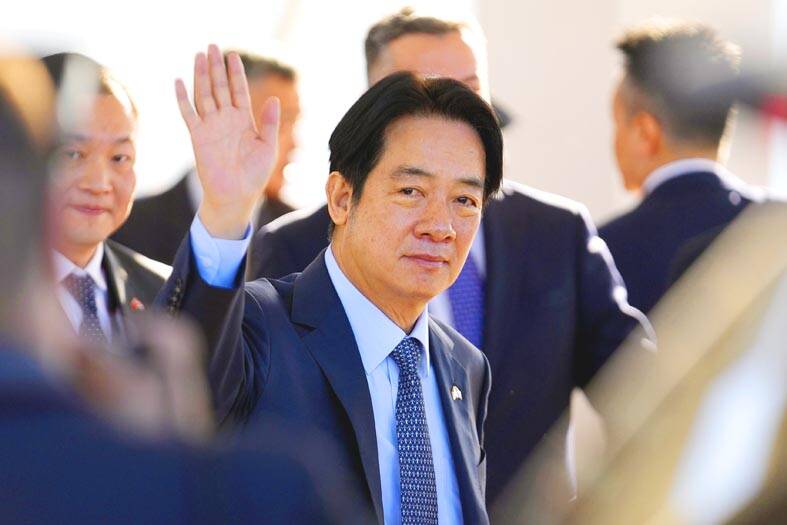Taiwan is a “sovereign, independent country,” Democratic Progressive Party (DPP) presidential candidate William Lai (賴清德) told Bloomberg Businessweek in an interview, adding that he had no plans to purse formal independence.
“Taiwan is already a sovereign, independent country called the Republic of China,” Vice President Lai said, echoing a stance President Tsai Ing-wen (蔡英文) made public three years ago, in his first interview with an international media outlet since becoming vice president in 2020.
“And in respect to unifying Taiwanese society, President Tsai has used the term Republic of China (Taiwan) to describe our country. I will continue to do so in the future,” he said. “There are no plans to change the name of our country.”

Photo: AP
“It is not necessary to declare independence,” he said in an interview aired on Tuesday while he is on a seven-day trip to the US and Paraguay. “The Republic of China and the People’s Republic of China are not subordinate to one another.”
Asked by editor Joel Weber about whether he has a road map to Taiwan’s formal independence, Lai, who has on more than one occasion described himself as a “pragmatic worker for Taiwan independence,” said “no such framework exists.”
“My responsibility is to maintain the status quo in the Taiwan Strait, while protecting Taiwan and maintaining democracy, peace and prosperity,” the 63-year-old said.
At the same time, Lai pitched himself as a “rational and steady” leader who is able to continue Tsai’s policy and work with the US government effectively.
“I have been part of President Tsai’s national security team,” which has “responsible and clear channels of communications” with Washington, he said.
Lai described next year’s presidential election as a decision between further engaging with the international community and working with China through caving in to its political agenda.
Lai is leading in most opinion polls, with Taiwan People’s Party Chairman Ko Wen-je (柯文哲) and New Taipei City Mayor Hou You-yi (侯友宜) of the Chinese Nationalist Party (KMT) trailing.
While stressing that he remains “open” to engaging in dialogue with China, Lai took note of the security challenges facing Taiwan because of Beijing’s “tendency to annex Taiwan” and refusal to denounce the use of force.
These challenges are of global concern, he said, adding that the international community must respond to China’s actions, which he said “are the reasons for tensions” in the Taiwan Strait.
Lai is in Paraguay for the inauguration of Paraguayan President Santiago Pena. Paraguay is one of only 13 UN member states to maintain diplomatic ties with Taipei.
He transited through New York on his way there, drawing anger from China, which said he was a separatist and “troublemaker,” and he is due back in Taipei on Friday after stopping over in San Francisco.
Additional reporting by Reuters

INVESTIGATION: The case is the latest instance of a DPP figure being implicated in an espionage network accused of allegedly leaking information to Chinese intelligence Democratic Progressive Party (DPP) member Ho Jen-chieh (何仁傑) was detained and held incommunicado yesterday on suspicion of spying for China during his tenure as assistant to then-minister of foreign affairs Joseph Wu (吳釗燮). The Taipei District Prosecutors’ Office said Ho was implicated during its investigation into alleged spying activities by former Presidential Office consultant Wu Shang-yu (吳尚雨). Prosecutors said there is reason to believe Ho breached the National Security Act (國家安全法) by leaking classified Ministry of Foreign Affairs information to Chinese intelligence. Following interrogation, prosecutors petitioned the Taipei District Court to detain Ho, citing concerns over potential collusion or tampering of evidence. The

NEGOTIATIONS: Taiwan has good relations with Washington and the outlook for the negotiations looks promising, Minister of Economic Affairs J.W. Kuo said Taiwan’s GDP growth this year is expected to decrease by 0.43 to 1.61 percentage points due to the effects of US tariffs, National Development Council (NDC) Minister Paul Liu (劉鏡清) said at a meeting of the legislature’s Economics Committee in Taipei yesterday, citing a preliminary estimate by a private research institution. Taiwan’s economy would be significantly affected by the 32 percent “reciprocal” tariffs slapped by the US, which took effect yesterday, Liu said, adding that GDP growth could fall below 3 percent and potentially even dip below 2 percent to 1.53 percent this year. The council has commissioned another institution

NEGOTIATIONS: The US response to the countermeasures and plans Taiwan presented has been positive, including boosting procurement and investment, the president said Taiwan is included in the first group for trade negotiations with the US, President William Lai (賴清德) said yesterday, as he seeks to shield Taiwanese exporters from a 32 percent tariff. In Washington, US Trade Representative Jamieson Greer said in an interview on Fox News on Thursday that he would speak to his Taiwanese and Israeli counterparts yesterday about tariffs after holding a long discussion with the Vietnamese earlier. US President Donald Trump on Wednesday postponed punishing levies on multiple trade partners, including Taiwan, for three months after trillions of US dollars were wiped off global markets. He has maintained a 10 percent

TRADE: The premier pledged safeguards on ‘Made in Taiwan’ labeling, anti-dumping measures and stricter export controls to strengthen its position in trade talks Products labeled “made in Taiwan” must be genuinely made in Taiwan, Premier Cho Jung-tai (卓榮泰) said yesterday, vowing to enforce strict safeguards against “origin laundering” and initiate anti-dumping investigations to prevent China dumping its products in Taiwan. Cho made the remarks in a discussion session with representatives from industries in Kaohsiung. In response to the US government’s recent announcement of “reciprocal” tariffs on its trading partners, President William Lai (賴清德) and Cho last week began a series of consultations with industry leaders nationwide to gather feedback and address concerns. Taiwanese and US officials held a videoconference on Friday evening to discuss the